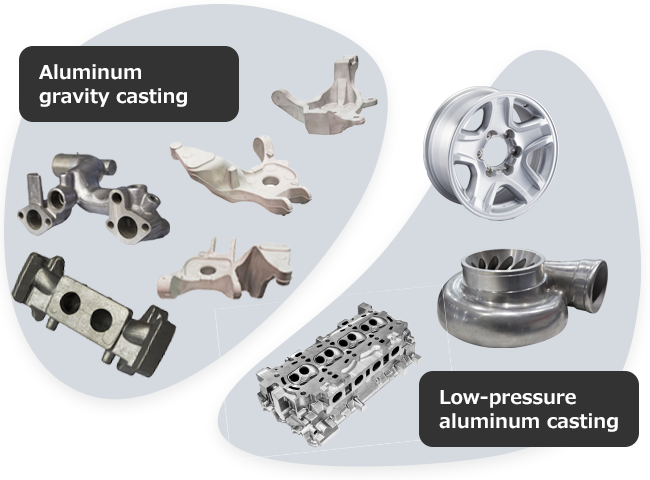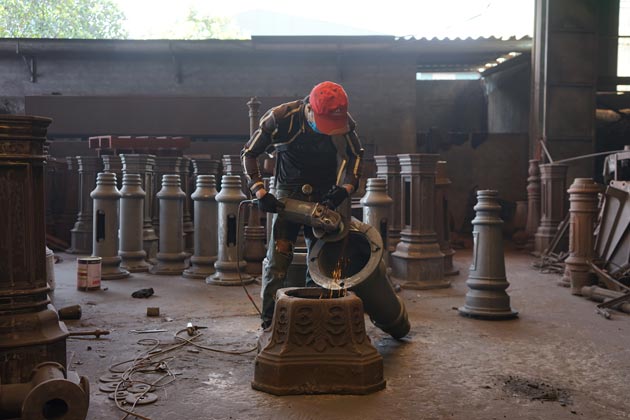Exploring Aluminum Foundry Wisconsin and its role in industrial casting
Wiki Article
Just How Aluminum Foundry Adds to Improvements in Aerospace Design
Aluminum shops are important to improvements in aerospace engineering. They create light-weight, high-strength elements that are crucial for modern-day airplane. With innovative spreading techniques, these factories produce complicated geometries that improve structural integrity. In addition, the growth of exceptional Aluminum alloys sustains the sector's focus on gas efficiency and sustainability. Nevertheless, obstacles remain in the production process. Comprehending these factors discloses the profound effect of Aluminum on aviation's future.The Relevance of Lightweight Materials in Aerospace Style
As the aerospace industry proceeds to evolve, the importance of lightweight materials becomes increasingly obvious. The need for efficiency and sustainability drives designers to prioritize making use of products that reduce overall weight without endangering structural honesty. Lightweight products, particularly Aluminum, play a crucial role in improving fuel efficiency, boosting payload capacity, and increasing the total efficiency of aircraft.The combination of these materials allows for innovative styles, making it possible for suppliers to create even more aerodynamic shapes that can stand up to extreme problems. The reduction in weight not just reduces functional prices however also adds to a lowered environmental footprint, lining up with worldwide initiatives towards sustainability in aviation.
Advanced Spreading Techniques in Aluminum Foundries
Advanced spreading techniques in Aluminum foundries play a critical duty in aerospace engineering by enabling the manufacturing of accurate and lightweight elements. Innovations in mold design and accuracy casting processes are essential in attaining ideal performance and structural integrity. Additionally, the advancement of light-weight alloys boosts the total effectiveness and performance of aerospace applications.Cutting-edge Mold And Mildew Layout
Innovative mold and mildew style plays an important role in the performance and performance of Aluminum shops, particularly within the aerospace field. By leveraging advanced materials and methods, modern-day molds can be crafted to hold up against high temperatures and pressures, making certain peak performance during the spreading process. These layouts commonly integrate complex geometries that permit the production of light-weight yet structurally audio elements, necessary for aerospace applications. In addition, the usage of computer-aided style (CAD) software promotes precise modeling, allowing foundries to replicate and refine mold and mildew designs prior to physical production starts. This not only boosts the quality of actors components but additionally lowers waste and lead times, leading to substantial expense financial savings. Generally, ingenious mold design is a foundation of progress in Aluminum Foundry modern technology for aerospace design.Accuracy Casting Processes
The effectiveness of cutting-edge mold and mildew designs effortlessly integrates with accuracy casting procedures, which are crucial for creating high-grade Aluminum parts in aerospace engineering. These procedures, consisting of sand spreading, die spreading, and investment casting, guarantee the production of complicated geometries with tight tolerances. Advanced methods like vacuum spreading and pressure die casting enhance the stability and surface area coating of the last products. Accuracy spreading lessens material waste while optimizing the mechanical homes of Aluminum, essential for aerospace applications. In enhancement, utilizing real-time surveillance and progressed simulation devices throughout the casting procedure enables instant modifications, resulting in boosted top quality control. Jointly, these accuracy casting processes setting Aluminum shops at the leading edge of aerospace development, supporting the industry's demand for dependability and efficiency.Lightweight Alloy Development
As aerospace engineers look for to boost gas effectiveness and efficiency, lightweight alloy development becomes an important focus in Aluminum foundries. These factories use advanced casting strategies to develop alloys that supply superior strength-to-weight ratios. Advancements in alloy composition, including the incorporation of elements like lithium and magnesium, enable the production of materials that withstand severe problems while minimizing overall aircraft weight. Strategies such as die casting and financial investment casting facilitate the accuracy manufacturing of intricate shapes, which are crucial for aerospace applications. Additionally, recurring study aims to enhance these alloys for enhanced mechanical properties and boosted durability. By prioritizing lightweight alloy development, Aluminum factories substantially add to the development of aerospace engineering, leading the way for much more efficient and lasting aircraft designs.
Enhancing Architectural Integrity With Aluminum Elements
Aluminum components supply considerable benefits in improving structural stability within aerospace engineering. Their light-weight nature adds to overall performance while preserving strength, which is essential for aircraft efficiency. In addition, the anxiety resistance homes of Aluminum aid guarantee the durability and dependability of aerospace structures under different operational conditions.
Lightweight Material Perks
While conventional materials usually compromise weight for strength, making use of Aluminum components in aerospace design supplies substantial benefits in architectural stability. Aluminum's light-weight nature contributes to overall design efficiency, enabling even more structured airplane that take in less gas, consequently boosting sustainability. The material's outstanding strength-to-weight proportion warranties that parts keep durability without adding unnecessary mass. This quality promotes improved performance and agility in flight, as well as maximized payload capacities. Additionally, Aluminum's resistance to corrosion prolongs the lifespan of aerospace frameworks, decreasing upkeep expenses and improving security. As producers increasingly take on Aluminum alloys, the aerospace market experiences a transformative change in the direction of more efficient and reliable engineering services that focus on both efficiency and environmental duty.Anxiety Resistance Properties
Although numerous materials have special properties, Aluminum's remarkable stress and anxiety resistance stands apart as an important element in boosting the structural honesty of aerospace parts. This resistance plays a vital role in making certain that airplane can stand up to various functional stresses, consisting of exhaustion, effect, and ecological conditions. Aluminum alloys, specifically engineered for aerospace applications, display high tensile toughness while maintaining light-weight qualities, allowing engineers to make extra visit this website effective frameworks - Aluminum Foundry. Furthermore, the capability of Aluminum to sustain cyclic loading without substantial contortion adds to the long life and reliability of aerospace components. As innovations continue in Aluminum Foundry techniques, the growth of stress-resistant Aluminum components promises additional renovations in efficiency, safety, and efficiency throughout the aerospace sector, solidifying Aluminum's duty as a favored product in modern-day engineeringFuel Effectiveness Improvements Driven by Aluminum Innovations
As the aerospace sector seeks to improve gas efficiency, cutting-edge usages of Aluminum have arised as an important solution. Aluminum's light-weight nature notably lowers aircraft weight, enabling for lower fuel usage during flight. This decrease in weight is vital, as also small declines can cause significant improvements in overall gas economic situation.Advanced Aluminum alloys, designed for boosted strength and longevity, allow manufacturers to create elements that keep structural honesty while minimizing mass - Aluminum Foundry. Additionally, the integration of Aluminum in airframes and engine components assists in enhanced aerodynamics, adding to minimized drag and raised efficiency
The fostering of Aluminum in aerospace not just fulfills the demand for fuel-efficient design but likewise lines up with regulatory pressures for reduced emissions. As these developments remain to develop, they play a considerable role in setting brand-new benchmarks for gas efficiency, guaranteeing that the aerospace market can satisfy expanding economic and environmental difficulties.

The Role of Aluminum in Sustainable Aviation Practices
The raising focus on sustainable air travel methods has placed Aluminum as a necessary material in the quest for greener airplane layout. Recognized for its lightweight residential or commercial properties, Aluminum significantly minimizes aircraft More hints weight, bring about lower fuel intake and exhausts. Its recyclability additionally enhances its sustainability account, as Aluminum can be reused indefinitely without loss of top quality. This characteristic supports a round economy within the aviation sector, reducing waste and source exhaustion.Advancements in Aluminum alloys have improved their stamina and deterioration resistance, enabling for longer service life and reduced maintenance requirements. These technologies facilitate the growth of more efficient airplane frameworks, contributing to general sustainability initiatives. Furthermore, Aluminum's thermal conductivity plays a crucial role in energy-efficient styles, boosting systems such as warm exchangers. Jointly, these features underscore Aluminum's pivotal duty in progressing lasting air travel, aligning with international campaigns focused on decreasing the environmental influence of air travel.
Challenges Encountered by Aluminum Foundries in Aerospace Manufacturing
While Aluminum foundries play a vital duty in aerospace production, they face considerable difficulties that can influence manufacturing efficiency and high quality. One major difficulty is the rigorous quality assurance standards called for in the aerospace sector. Any kind of defect can jeopardize security and efficiency, demanding rigorous assessment processes that extend production timelines. Furthermore, factories often emulate varying raw product prices, which can affect pricing and profitability. The intricacy of Aluminum alloys used in aerospace applications additional makes complex the manufacturing procedure, as accurate formulations are critical for accomplishing desired mechanical residential or commercial properties. Experienced labor shortages impede the ability to maintain high-grade manufacturing degrees. Environmental regulations enforce restrictions on discharges and waste monitoring, calling for factories to spend in lasting methods, which can be cost-prohibitive. These elements jointly develop a landscape where Aluminum factories must continually adjust to fulfill the advancing needs of aerospace manufacturing while making certain safety and security and conformity.Future Trends in Aluminum Applications for Aerospace Engineering
With improvements in modern technology and increasing demands for efficiency, the future of Aluminum applications in aerospace design is positioned for substantial change. The assimilation of ingenious Aluminum alloys and composites is expected to enhance strength-to-weight ratios, leading to more fuel-efficient aircraft styles. Additionally, improvements in additive production strategies will allow for the manufacturing of intricate Aluminum structures that were previously difficult, enhancing efficiency and decreasing waste.
Lasting techniques will play an essential duty, with an expanding focus on reusing Aluminum to decrease ecological influence. The aerospace field is most likely to welcome smarter making processes, such as automation and synthetic knowledge, making sure better and precision in Aluminum components. Moreover, cooperations in between Aluminum foundries and aerospace firms will certainly promote r & d, leading the way for new applications that meet the rigorous requirements of modern-day aerospace design - Aluminum Foundry. In general, the future looks assuring for Aluminum's function fit the skies
Frequently Asked Concerns
What Are the Ecological Effects of Aluminum Manufacturing in Aerospace?
The environmental influences of Aluminum manufacturing in aerospace include substantial energy intake, greenhouse gas discharges, and environment interruption. Additionally, mining procedures can cause dirt deterioration and water contamination, increasing issues about sustainability and eco-friendly equilibrium.Exactly How Does Aluminum Compare to Various Other Products in Aerospace Applications?
Aluminum provides a special combination of light-weight homes, deterioration resistance, and cost-effectiveness contrasted to other materials. Its high strength-to-weight proportion makes it particularly helpful for aerospace applications, boosting gas performance and total efficiency in airplane design.What Qualifications Do Aluminum Foundry Employees Need for Aerospace Projects?
Aluminum Foundry workers require specific training in metallurgy and casting methods, together with understanding of aerospace sector standards. Accreditations in high quality control and safety procedures are additionally vital to guarantee compliance with rigid aerospace task requirements.Exist Any Safety And Security Worry About Utilizing Aluminum in Aerospace Engineering?
Safety problems relating to Aluminum in aerospace engineering include vulnerability to rust, exhaustion, and anxiety cracks. Appropriate therapy and alloy selection are important to reduce these risks, guaranteeing architectural stability and total safety in aerospace applications.Just How Does Aluminum Recycling Benefit the Aerospace Industry?
Aluminum recycling substantially profits the aerospace industry by lowering product prices, minimizing ecological influence, and saving power. This lasting method boosts the market's performance while advertising the use of light-weight, high-performance parts in aircraft production.Advanced casting methods in Aluminum foundries play a vital duty in aerospace engineering by making it possible for the manufacturing of lightweight and accurate parts. Cutting-edge mold style plays an important role in the performance and efficiency of Aluminum foundries, especially within the aerospace sector. As aerospace designers seek to enhance fuel efficiency and performance, lightweight alloy growth ends up being a vital emphasis in Aluminum factories. Aluminum alloys, particularly crafted for aerospace applications, exhibit high tensile stamina while preserving light-weight you can try this out characteristics, enabling engineers to create a lot more efficient frameworks. Collaborations between Aluminum factories and aerospace companies will promote study and advancement, leading the way for new applications that fulfill the rigorous needs of contemporary aerospace design.
Report this wiki page